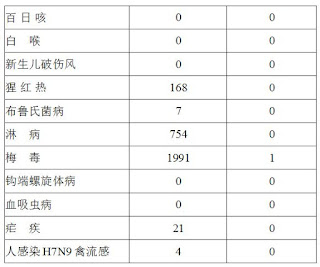#12,004
Nearly two years ago, after having been remarkably open about H7N9 for their first two winter outbreaks, China's MOH abruptly stopped issuing real-time (often daily) updates on new cases, and instead moved to making batch announcements, sometimes weeks after the fact.
Some provinces (particularly Guangdong) continued to notify Hong Kong when new cases were discovered - although delays in those notifications have grown as well.
The upshot is that we have only a partial grasp on what going on in China with H7N9, H5N1, or H5N6 in real time. And no news isn't necessarily good news.
Officially China has only reported 3 H7N9 cases since the start of October (1 in Jiangsu & 1 in Zhejiang both in October & 1 in Guangdong Province presumably in November).
Today we are starting to see end-of-month epidemiology reports start to trickle out of China's provinces, and we learn that Jiangsu Province reports 4 H7N9 cases for the month of November and Fujian Province reported 1.
The Jiangsu notice is buried near the bottom of a chart included with their end-of-month epidemiology report (see below).
Ministry of Health and Family Planning Commission announced in November 2016 the province's statutory reporting infectious diseases
At 0:00 on November 1 2016 to November 30 24, the province reported a total of A and B infectious diseases statutory reporting 7997 cases, 23 deaths; this month, in addition to plague, cholera, SARS, spinal cord polio, human infection with highly pathogenic avian influenza, anthrax, whooping cough, diphtheria, neonatal tetanus, leptospirosis, schistosomiasis no incidence report, the remaining 17 kinds of categories A and B infectious diseases were case reports. Reported incidence of the top five diseases: tuberculosis, syphilis, hepatitis, gonorrhea, dysentery, accounting for 94.20 percent of the total reported cases. Report deaths to the top three diseases: AIDS, rabies and tuberculosis, accounting for 91.30 percent of total deaths.
Schedule: November 2016, Jiangsu Province, statutory reporting and B infectious disease, mortality tables
December 5, 2016
While there is no mention of H7N9 anywhere in the body of the report, the accompanying two-page schedule - at the very bottom - lists 4 new H7N9 cases during the month of November. No details are provided.
The Fujian EOM report mentions 1 case in the body of their report, again with no details.
Published: 2016-12-09
With just two of China's provinces reporting, the number of H7N9 cases we know about this fall has jumped to 8. Not a sign of a major outbreak by any means, but it does show that the virus isn't quite as quiet as initial reports would have us believe.
These cases represent only the `sickest of the sick' - those ill enough to seek medical attention and lucky enough to be tested for the virus - and so the true burden of H7N9 on the human population remains unknown.We generally get a recap from Beijing once all of the Provinces have reported, followed a week or two later by a WHO update.
Stay tuned.

